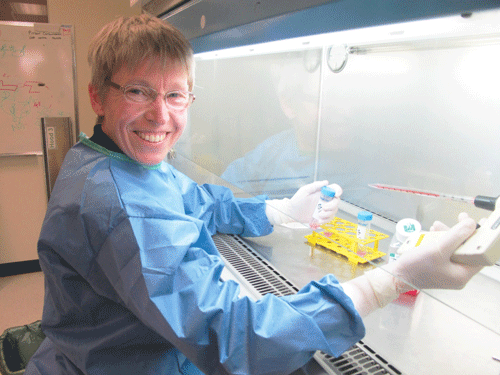
Within the Centre for Cancer Biology (CCB) labs, Adelaide's Medical Research Institute dedicated to cancer, a new drug has been developed with the potential to revolutionise the treatment of lung cancer.
Supported by you through the 2016 RAH Research Fund Impact Grant Round, Dr Joanna Woodcock is working with Professor Paul Reynolds, Director of the RAH Department of Thoracic Medicine's Lung Research Laboratory, on this exciting new research approaching lung cancer treatment from a different angle.
While standard chemotherapy targets all rapidly growing cells, Dr Woodcock and her research team, under the guidance of Professors Angel Lopez and Stuart Pitson at CCB, are looking at targeting a group of proteins that specifically play a role in the growth of a cancer tumour.
"For a long time we have treated cancer by targeting the cells that grow out of control with chemotherapy," Dr Woodcock said.
"What we've discovered is that a particular group of proteins are involved not only in the uncontrolled growth of cancer cells but also in their abnormal survival.
"I started studying these proteins in 2000 when they were known to be important proteins in cell biology but I wanted to understand how they worked. That led me to understand that these proteins are regulated under normal circumstances and I realised they were involved in lung cancer.
"After discovering this we needed to find a way to target these proteins to develop new treatments, and interestingly we found this by studying nature."
To develop the new treatment, Dr Woodcock studied the chemical make-up of compounds found in nature that naturally block these proteins.
She has used this knowledge to generate similar compounds that prevent the proteins from being used by cancer cells to grow and survive.
"The new compounds are doing exactly what we predict – stopping the cancer cells growing and causing them to die."
Now in the early stages of this new anti-cancer breakthrough, and with the support of the RAH Research Fund community, Dr Woodcock along with Professor Paul Reynolds and his team are eager to launch the next phase of this research – preclinical testing.
"The plan is to take this to the next level and test the compounds on patient tissue in the lab with the hope that it can lead to an improved treatment for lung cancer," Dr Woodcock said.
"Current treatments for advanced lung cancer remain poor, with average survival less than 12 months. Better targeting of treatments by more careful analysis and testing on actual patient tumour tissue is recognised as essential to improving outcomes, and this new collaboration directly addresses this need."
With more evidence demonstrating the potential of this new anti-cancer approach, they hope to attract further funding and research.
"The idea of this approach is to use these new compounds, not necessarily by themselves, but in combination with other treatments," Dr Woodcock said.
"This is a molecular targeted treatment that will help attack the cancer cells more effectively, which means much less chemotherapy and so the side effects for the patient are substantially less as well."
Excited about the possibilities for this research, Dr Woodcock is confident the findings will also have the potential to improve the treatment of other debilitating diseases.
"This family of proteins have now been confirmed as a good target for cancer in general and potentially other diseases which is very exciting."
After completing her PhD and moving to Adelaide from the UK 25 years ago, Dr Woodcock has dedicated her career to researching cancer.
Teaming with Professor Paul Reynolds will provide a valuable partnership to develop her new anti-cancer approach further.
"It was always my ambition to work in cancer research. The signalling between cells has fascinated me since my undergraduate days," Dr Woodcock said.
"All these decisions are going on in every cell every day and it just makes me think, wow!" Dr Woodcock said.
see original article posted on Royal Adelaide Hospital Research Fund website


